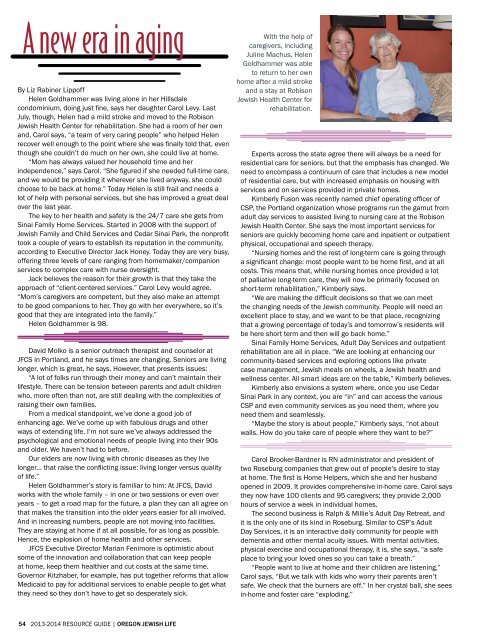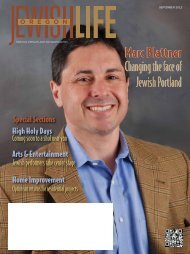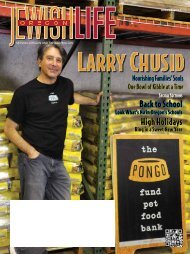Download - Oregon Jewish Life Magazine
Download - Oregon Jewish Life Magazine
Download - Oregon Jewish Life Magazine
Create successful ePaper yourself
Turn your PDF publications into a flip-book with our unique Google optimized e-Paper software.
A new era in aging<br />
By Liz Rabiner Lippoff<br />
Helen Goldhammer was living alone in her Hillsdale<br />
condominium, doing just fine, says her daughter Carol Levy. Last<br />
July, though, Helen had a mild stroke and moved to the Robison<br />
<strong>Jewish</strong> Health Center for rehabilitation. She had a room of her own<br />
and, Carol says, “a team of very caring people” who helped Helen<br />
recover well enough to the point where she was finally told that, even<br />
though she couldn’t do much on her own, she could live at home.<br />
“Mom has always valued her household time and her<br />
independence,” says Carol. “She figured if she needed full-time care,<br />
and we would be providing it wherever she lived anyway, she could<br />
choose to be back at home.” Today Helen is still frail and needs a<br />
lot of help with personal services, but she has improved a great deal<br />
over the last year.<br />
The key to her health and safety is the 24/7 care she gets from<br />
Sinai Family Home Services. Started in 2008 with the support of<br />
<strong>Jewish</strong> Family and Child Services and Cedar Sinai Park, the nonprofit<br />
took a couple of years to establish its reputation in the community,<br />
according to Executive Director Jack Honey. Today they are very busy,<br />
offering three levels of care ranging from homemaker/companion<br />
services to complex care with nurse oversight.<br />
Jack believes the reason for their growth is that they take the<br />
approach of “client-centered services.” Carol Levy would agree.<br />
“Mom’s caregivers are competent, but they also make an attempt<br />
to be good companions to her. They go with her everywhere, so it’s<br />
good that they are integrated into the family.”<br />
Helen Goldhammer is 98.<br />
David Molko is a senior outreach therapist and counselor at<br />
JFCS in Portland, and he says times are changing. Seniors are living<br />
longer, which is great, he says. However, that presents issues:<br />
“A lot of folks run through their money and can’t maintain their<br />
lifestyle. There can be tension between parents and adult children<br />
who, more often than not, are still dealing with the complexities of<br />
raising their own families.<br />
From a medical standpoint, we’ve done a good job of<br />
enhancing age. We’ve come up with fabulous drugs and other<br />
ways of extending life. I’m not sure we’ve always addressed the<br />
psychological and emotional needs of people living into their 90s<br />
and older. We haven’t had to before.<br />
Our elders are now living with chronic diseases as they live<br />
longer... that raise the conflicting issue: living longer versus quality<br />
of life.”<br />
Helen Goldhammer’s story is familiar to him: At JFCS, David<br />
works with the whole family – in one or two sessions or even over<br />
years – to get a road map for the future, a plan they can all agree on<br />
that makes the transition into the older years easier for all involved.<br />
And in increasing numbers, people are not moving into facilities.<br />
They are staying at home if at all possible, for as long as possible.<br />
Hence, the explosion of home health and other services.<br />
JFCS Executive Director Marian Fenimore is optimistic about<br />
some of the innovation and collaboration that can keep people<br />
at home, keep them healthier and cut costs at the same time.<br />
Governor Kitzhaber, for example, has put together reforms that allow<br />
Medicaid to pay for additional services to enable people to get what<br />
they need so they don’t have to get so desperately sick.<br />
With the help of<br />
caregivers, including<br />
Juline Machus, Helen<br />
Goldhammer was able<br />
to return to her own<br />
home after a mild stroke<br />
and a stay at Robison<br />
<strong>Jewish</strong> Health Center for<br />
rehabilitation.<br />
Experts across the state agree there will always be a need for<br />
residential care for seniors, but that the emphasis has changed. We<br />
need to encompass a continuum of care that includes a new model<br />
of residential care, but with increased emphasis on housing with<br />
services and on services provided in private homes.<br />
Kimberly Fuson was recently named chief operating officer of<br />
CSP, the Portland organization whose programs run the gamut from<br />
adult day services to assisted living to nursing care at the Robison<br />
<strong>Jewish</strong> Health Center. She says the most important services for<br />
seniors are quickly becoming home care and inpatient or outpatient<br />
physical, occupational and speech therapy.<br />
“Nursing homes and the rest of long-term care is going through<br />
a significant change: most people want to be home first, and at all<br />
costs. This means that, while nursing homes once provided a lot<br />
of palliative long-term care, they will now be primarily focused on<br />
short-term rehabilitation,” Kimberly says.<br />
“We are making the difficult decisions so that we can meet<br />
the changing needs of the <strong>Jewish</strong> community. People will need an<br />
excellent place to stay, and we want to be that place, recognizing<br />
that a growing percentage of today’s and tomorrow’s residents will<br />
be here short term and then will go back home.”<br />
Sinai Family Home Services, Adult Day Services and outpatient<br />
rehabilitation are all in place. “We are looking at enhancing our<br />
community-based services and exploring options like private<br />
case management, <strong>Jewish</strong> meals on wheels, a <strong>Jewish</strong> health and<br />
wellness center. All smart ideas are on the table,” Kimberly believes.<br />
Kimberly also envisions a system where, once you use Cedar<br />
Sinai Park in any context, you are “in” and can access the various<br />
CSP and even community services as you need them, where you<br />
need them and seamlessly.<br />
“Maybe the story is about people,” Kimberly says, “not about<br />
walls. How do you take care of people where they want to be”<br />
Carol Brooker-Bardner is RN administrator and president of<br />
two Roseburg companies that grew out of people’s desire to stay<br />
at home. The first is Home Helpers, which she and her husband<br />
opened in 2009. It provides comprehensive in-home care. Carol says<br />
they now have 100 clients and 95 caregivers; they provide 2,000<br />
hours of service a week in individual homes.<br />
The second business is Ralph & Millie’s Adult Day Retreat, and<br />
it is the only one of its kind in Roseburg. Similar to CSP’s Adult<br />
Day Services, it is an interactive daily community for people with<br />
dementia and other mental acuity issues. With mental activities,<br />
physical exercise and occupational therapy, it is, she says, “a safe<br />
place to bring your loved ones so you can take a breath.”<br />
“People want to live at home and their children are listening,”<br />
Carol says. “But we talk with kids who worry their parents aren’t<br />
safe. We check that the burners are off.” In her crystal ball, she sees<br />
in-home and foster care “exploding.”<br />
54 2013-2014 RESOURCE GUIDE | OREGON JEWISH LIFE









